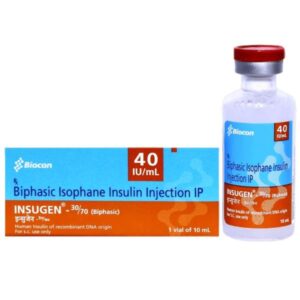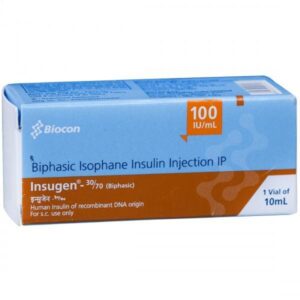INSULIN ISOPHANE HUMAN + INSULIN SOLUBLE
Insulin Isophane Human: Insulin Isophane Human is a type of insulin medication used to control blood sugar levels in individuals with diabetes. It is commonly known by its brand names NPH insulin or Neutral Protamine Hagedorn insulin.
Mechanism of Action:
Insulin Isophane Human is a intermediate-acting insulin that works by replacing the natural insulin that the body can no longer produce or use effectively. It mimics the action of endogenous insulin and helps regulate blood sugar levels by facilitating the uptake of glucose into cells for energy production and storage.
Use:
Insulin Isophane Human is primarily used to treat both type 1 and type 2 diabetes. It helps stabilize blood sugar levels throughout the day and can be used with other forms of insulin or oral diabetes medications. It is typically administered through subcutaneous injection.
Dose:
The dosage of Insulin Isophane Human varies depending on individual needs, blood sugar levels, and the recommendations of a healthcare professional. It is important to closely follow the prescribed dosage and administration instructions, which may include timing and injection technique.
Side Effects:
Like any medication, Insulin Isophane Human can cause some side effects. Common side effects include injection site reactions such as pain, redness, or irritation. Additionally, some individuals may experience low blood sugar (hypoglycemia) symptoms such as sweating, dizziness, shakiness, or confusion. It is important to monitor blood sugar levels regularly and seek medical attention if any severe or persistent side effects occur.
It is essential to consult a healthcare professional for specific dosing instructions and to report any concerning side effects or changes in health while using Insulin Isophane Human.
Insulin Soluble: Insulin Soluble is a medication used for the treatment of diabetes. It belongs to the class of drugs called insulin, which helps regulate blood sugar levels.
Insulin Soluble works by mimicking the effects of natural insulin in the body. Insulin is normally produced by the pancreas and helps transport glucose from the bloodstream into cells, where it is used for energy. In people with diabetes, either the pancreas does not produce enough insulin (Type 1 diabetes) or the body’s cells do not respond properly to insulin (Type 2 diabetes). Insulin Soluble helps to lower blood sugar levels by facilitating the uptake of glucose into the cells.
The dose of Insulin Soluble varies depending on individual factors such as the person’s blood sugar levels, diet, and lifestyle. It is typically administered by injection, either subcutaneously (under the skin) or intramuscularly (into the muscle). The dose and frequency of administration are determined by a healthcare professional and may need to be adjusted over time.
Like all medications, Insulin Soluble can have side effects. These can include hypoglycemia (low blood sugar levels), allergic reactions at the injection site, redness or swelling at the injection site, weight gain, and hypokalemia (low potassium levels). It is important to note that the risk and severity of side effects may vary from person to person.
It is crucial to follow the prescribed dosage and administration instructions provided by your healthcare provider and regularly monitor your blood sugar levels while taking Insulin Soluble. It is also important to inform your doctor about any other medications you are taking, as they may interact with Insulin Soluble.
Cold chain products like insulins, vaccines etc. are available for pickup only.


